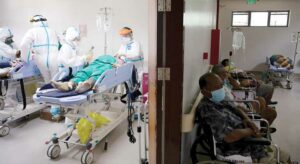HEALTHCARE SPENDING in relation to the size of the economy rose to 5.9% in 2023 from a revised 5.6% a year earlier, the Philippine Statistics Authority (PSA) reported on Tuesday.
Citing preliminary data, the PSA said the ratio of national health expenditure to gross domestic product (GDP) was the highest since the 6.4% posted in 2021.
Current health expenditure grew 9.2% to P1.24 trillion in 2023, while gross health capital formation expenditure more than doubled to P197.07 billion last year.
This brought total health spending to P1.44 trillion in 2023, up 17%. Spending was at its highest level since the PSA began to track health spending in 1991.
Out-of-pocket payments by households accounted for 44.4% of current health expenditure last year amounting to P550.19 billion, up 8.5%.
Government schemes and compulsory contributory healthcare financing rose 2.2% to P528.75 billion. These categories accounted for 42.6% of current health spending in 2023.
Spending by voluntary healthcare payment schemes rose 44.6% to P161.35 billion last year, accounting for 13% share of current health spending last year.
Robert Dan J. Roces, chief economist at Security Bank Corp., said the increase in health spending last year was due to inflation, an aging population, and rising cases of chronic disease.
“Higher healthcare costs may strain household budgets, impacting consumption and economic growth,” Mr. Roces said via Viber.
Inflation averaged 6% last year, accelerating from a revised 5.8% in 2022. It was the strongest reading since the 8.2% posted in 2008 at the height of the global financial crisis.
The economy grew by a revised 5.5% last year, slowing from 7.6% in 2022.
On a per capita basis, health-related spending rose 8.3% to P11,082.68 last year.
Hospitals received 46.1% of all health spending last year, against 48.9% in 2022.
In absolute terms, hospitals took in P571.77 billion, up from P554.98 billion a year earlier.
Retailers and other providers of medical goods took in 29% of spending (P360.05 billion in 2023 from P331.92 billion in 2022) while providers of healthcare system administration and financing accounted for 9% (P111.47 billion from P56.90 billion).
“In this case, it may be that healthcare costs are rising. But in the long run, in an inflationary environment, healthcare spending gets a smaller allocation in the budget of the consumer, favoring instead spending on other items such as food,” said Mr. Roces. — Charles Worren E. Laureta

